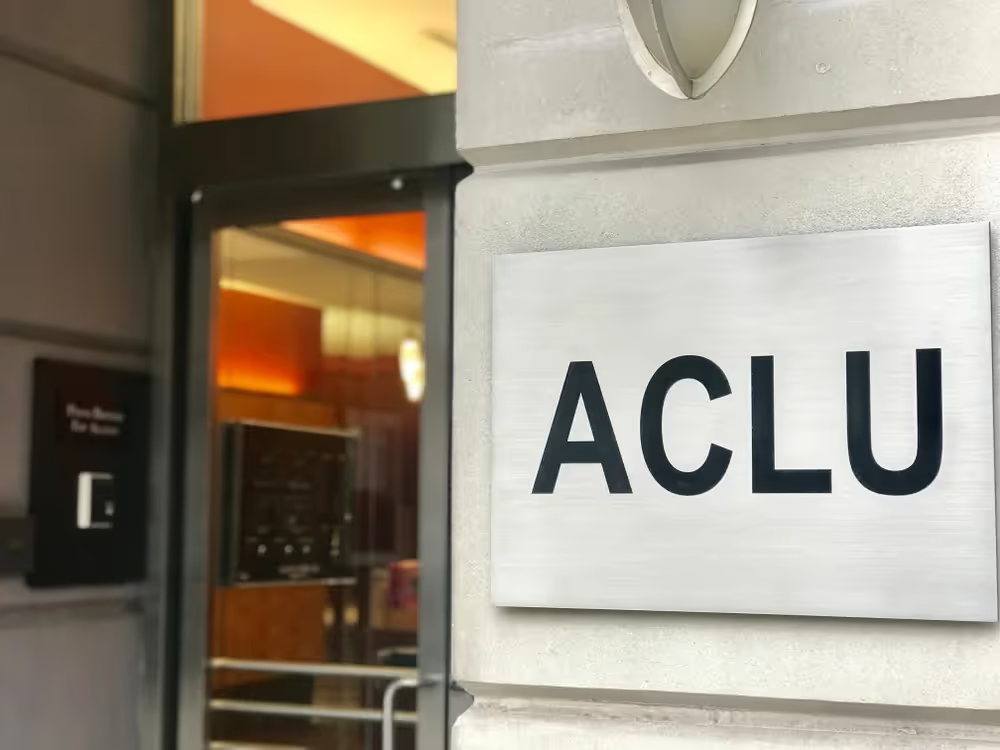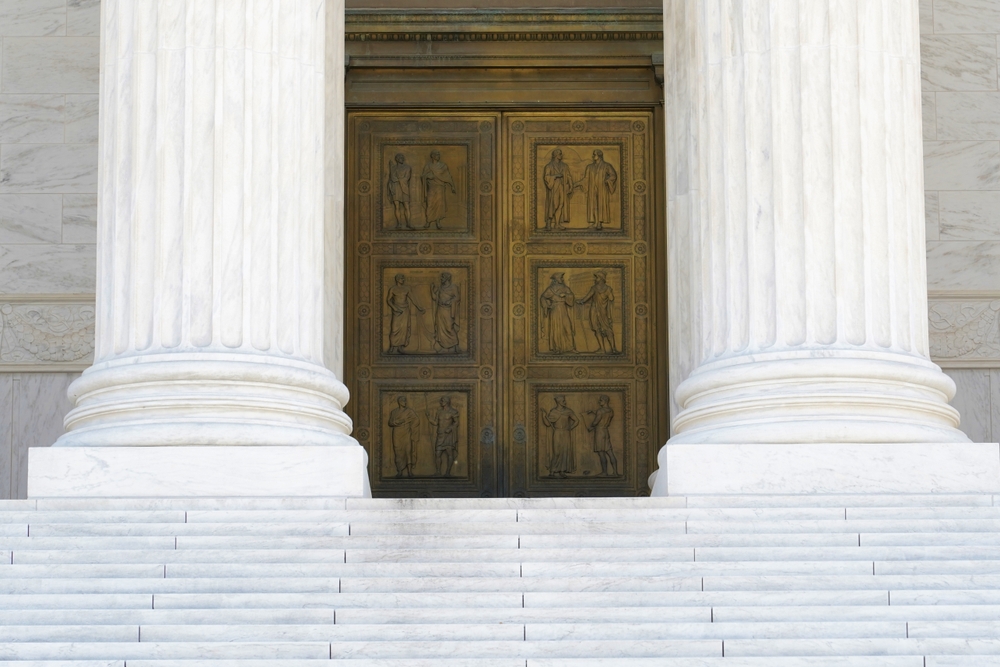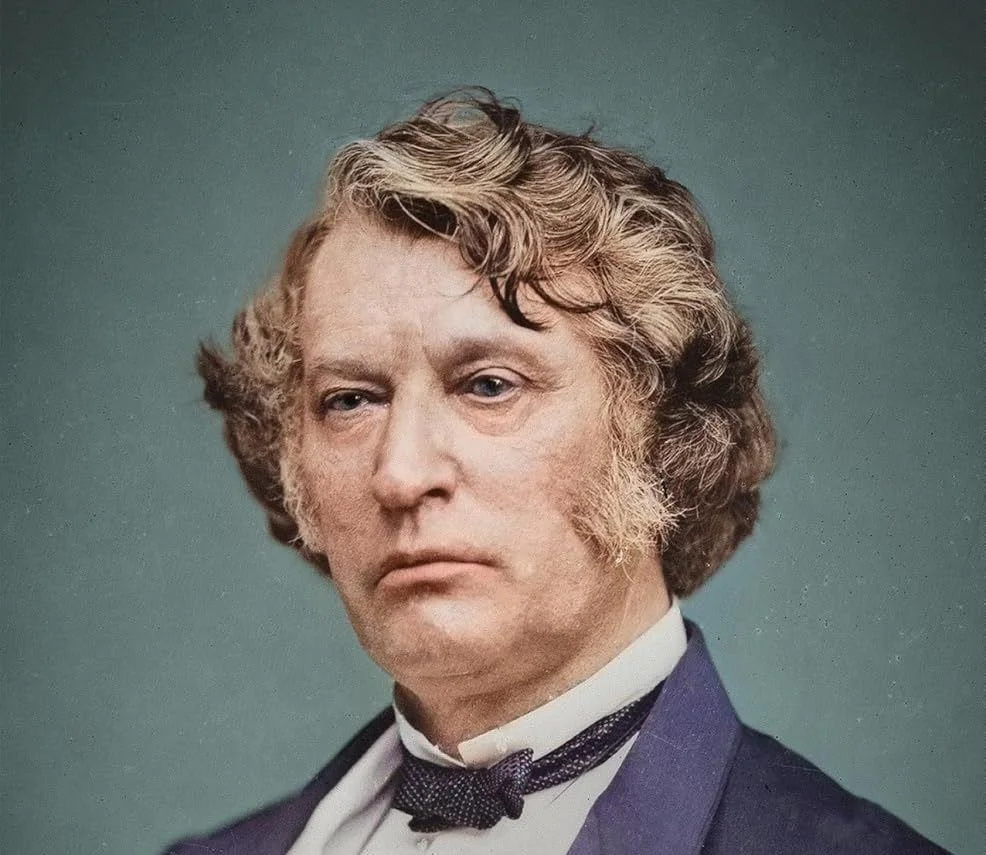
The ACLU to the Supremes: Ignore Our Transgender Athletics Case
Munsingwear Madness: The ACLU’s Attempt to Scuttle Women’s Sports at SCOTUS.
On July 3 of this year, the Supreme Court granted the petition for cert in Little v. Hecox to determine whether state bans on natal men in women’s scholastic athletics are constitutional under the 14th Amendment’s Equal Protection Clause. But now, in a classic game of dirty pool, the American Civil Liberties Union (ACLU) has astonishingly filed a motion to dismiss its challenge in the case. This case had promised to be one of the Supreme Court’s marquee disputes of the October term.
The move reeks of bad faith.
The ACLU represents transgender athlete Lindsay Hecox, a senior at Boise State University and a biological male, in his challenge to Idaho’s Fairness in Women’s Sports Act. Together with 26 other states, Idaho enacted a law mandating that participation in women’s scholastic athletics be limited to biological females. In so doing, it eliminated the participation of so-called “transgender” females who are biologically male. As it was for other states, the law’s enactment was a legislative necessity borne of the Biden Administration’s pel-mel manipulation of federal civil rights laws and the substitution of gender identity for biological sex in all federally funded programs.
In the litigation below, the district court enjoined Idaho’s law for violating the Equal Protection Clause, and on appeal, the Ninth Circuit affirmed. The court held that Idaho’s definition of sex was discriminatory, asserting that one’s perceived internal gender identity determines sex. The court then went further, dismissing concerns of fairness in athletic competition, noting the rarity of transgender athletes in women’s sports, and stressing the availability of testosterone suppression, which could mute the athletic advantages of natal men.
Yet after having won at both the trial and appellate court levels, the ACLU now wants to take its ball and go home. In a short filing on September 2, Hecox’s lawyers explained that he had been dealing with illness, “[his] father’s passing,” and “negative public scrutiny from certain quarters because of this litigation,” and will therefore no longer play women’s sports in Idaho. Among other authorities, it cites the Supreme Court’s 1950 opinion, United States v. Munsingwear in which the Court determined that “[t]he established practice of the Court in dealing with a civil case from a court in the federal system which has become moot while on its way here or pending our decision on the merits is to reverse or vacate the judgment below and remand with a direction to dismiss.” The ACLU avers that despite its request, the petition state has suffered no prejudice.
I’d wager the taxpayers, legislators, and officials of the state of Idaho would beg to differ.
In its Suggestion of Mootness, the ACLU argues:
Because Ms. Hecox stated in the notice that her dismissal [in the district court] was with prejudice…there is no possibility that the controversy might reemerge. Ms. Hecox respectfully submits that this case is moot because she has no live claim against petitioners. Because Ms. Hecox’s voluntary decision to dismiss her claim mooted the case, the court of appeals’ decision in her favor should be vacated. The Court should therefore vacate the court of appeals’ judgment and remand with instructions to dismiss the appeal.
Is this a real loss for Hecox? Unlikely.
His challenge began in 2020, and the Idaho law was enjoined by the district court shortly after. After Idaho appealed to the 9th Circuit, the judgment of the court was entered a full four years later, giving Hecox ample time to try out for, compete in, and win women’s sporting events. His suggestion of mootness and voluntary “withdrawal” from women’s sports smacks of intentional prejudice, gamesmanship, and cowardice.
Idaho Solicitor General Alan Hurst has informed the ACLU and the Supreme Court that the state plans to oppose the ACLU’s request to moot the case. And rightly so.
After back-to-back wins, why is the ACLU trying now to scuttle the issue of women’s sports?
I’ll venture a guess: because the outcome in Little v. Hecox is nearly certain to favor the state of Idaho, which would make the Munsingwear vacatur request nothing more than a convenient — if ill-concealed — dodge.
Consider a bit of SCOTUS recent history.
Originally, the ACLU had suggested the Court could hold Idaho’s petition for cert pending disposition of United States v. Skrmetti – last term’s blockbuster determining the constitutionality of state bans on so-called “gender affirming” medical interventions for minors.
But in Skrmetti, by way of a 6-3 opinion by Chief Justice Roberts (joined in full by Justices Thomas, Gorsuch, Kavanaugh, and Barrett, and in part by Justice Alito), the Court held that Tennessee’s law prohibiting gender-related medical interventions for minors did not violate the Equal Protection Clause and therefore did not require satisfaction of heightened scrutiny judicial review. The law, the Court wrote, neither categorizes by sex or transgender status, but rather, by age and medical diagnosis. Therefore, it was determined that Tennessee needed only to satisfy rational basis review and demonstrate that the law was a rational means of pursuing its legitimate governmental interest in protecting minors from experimental treatments, regret, and bodily harm.
Tennessee, the court held, had easily met this “relatively relaxed standard.”
Shortly thereafter, the Supreme Court granted review in Little v. Hecox and a companion case, B.P.J. v. West Virginia. The latter case raises questions about whether a similar women’s sports law violates both the Equal Protection Clause and Title IX of the Education Amendments of 1972, a federal civil rights law that prohibits sex discrimination in any federally funded education program or activity.
Did the Court’s ruling in Skrmetti elicit a hard swallow from Hecox’s lawyers? The similarities between Skrmetti and Hecox are striking, after all. Could this have prompted the ACLU’s suggestion of mootness, a desire to avoid the hoary eye of SCOTUS in exchange for Hecox’s one sports-free year?
In Skrmetti, the majority found that there were no sex-based or transgender status-based distinctions in the Tennessee law, thereby eschewing the need for Equal Protection Clause analysis. As with Tennessee’s law, Idaho’s sports law does not discriminate based on transgender status or sex. It treats both sexes equally by restricting individual sports participation to alignment with an athlete’s biological sex (internal, subjective sense of “gender identity” notwithstanding). Men’s sports are for men; women’s sports are for women. In this, both sexes are equally situated.
But even assuming arguendo that the Idaho law classifies based on transgender status and singles out those individuals for disparate treatment based on their characteristics or traits, Hecox and his lawyers would still be left wanting for a victory.
For proof, one needs to look no further than the Skrmetti opinions of Justice Amy Coney Barrett and Justice Samuel Alito.
Justice Barrett, while acknowledging that the court hadn’t needed to undertake the Equal Protection Clause analysis, noted that she would not find transgender individuals to constitute a suspect or quasi-suspect class. Barrett argued that “transgender status is not marked by the same sort of ‘obvious, immutable, or distinguishing characteristics’ as race or sex,” and that the “transgender population” was not a discrete group but diverse, large, and amorphous. To classify that group as a suspect class, she wrote, would “require courts to oversee all manner of policy choices normally committed to legislative discretion.” And she noted the court’s historic allergy to recognition of new suspect classes, including those based on mental disability, old age, and poverty, writing that the Court “has not recognized any new constitutionally protected classes in over four decades, and instead has repeatedly declined to do so.”
Barrett also cited the Court’s 2007 ruling in Gonzales v. Carhart for the proposition that “state and federal legislatures [have] wide discretion to pass legislation in areas where there is medical and scientific uncertainty.” She noted:
Beyond the treatment of gender dysphoria, transgender status implicates several other areas of legitimate regulatory policy—ranging from access to restrooms to eligibility for boys’ and girls’ sports teams. If laws that classify based on transgender status necessarily trigger heightened scrutiny, then the courts will inevitably be in the business of “closely scrutiniz[ing] legislative choices” in all these domains.
The respondents in Little v. Hecox have made just such a scrutinous request for review of Idaho’s legislative choices.
Similarly, in his opinion concurring in the judgment, Justice Alito stressed that the Court’s discussion of why the Tennessee law did not constitute a sex-based classification was unnecessary. He noted that the law made classifications based on transgender status and gender identity but noted that he would have held that “neither transgender status nor gender identity should be treated as a suspect or ‘quasi-suspect’ class.” Alito went on to say that the Court would nearly always determine that a sex-based classification was neutral unless it could be shown that it has been used as a “mere pretex[t] designed to effect an invidious discrimination against the members of one sex or the other.” Based on Tennessee’s stated legislative purpose in SB1 — to protect the health and welfare of minors — the challengers could not make such a showing of pretextual discrimination.
Based on Idaho’s stated legislative interest in protecting spaces and sports historically reserved exclusively for tens of millions of female athletes, the Skrmetti analysis would seem to yield the same result. States have a vested interest in legislating to protect their own citizens, including their female scholastic athletes. That interest does not amount to invidious discrimination against transgender-identified males.
What of Bostock v. Clayton County – the Court’s 2020 decision finding sexual orientation and gender identity discrimination to be forms of sex discrimination for purposes of Title VII’s employment discrimination prohibition? The Skrmetti court declined to consider whether Bostock would apply outside the context of Title VII, but Justice Alito pointed out that “The Equal Protection Clause does not contain the same wording as Title VII, and our cases have never held that Bostock’s methodology applies in cases in which a law is challenged as an unconstitutional sex classification.”
Alito’s opinion was entirely foreseeable after his colloquy with transgender ACLU attorney Chase Strangio during Skrmetti oral arguments. There, and on pressing from Alito, Strangio was forced to admit that no, transgender status was not, in fact, immutable (tacitly recognizing that an Equal Protection claim rooted in gender identity discrimination was likely to fail.) Of note: Strangio is on brief for the ACLU in Little v. Hecox, and is listed as one of the attorneys submitting the suggestion of mootness.
Alan Hurst, Solicitor General of Idaho, has requested an extension from SCOTUS and has until September 26 to respond to the ACLU’s filing. But on all predictive fronts, in a post-Skrmetti world, the ACLU would seem to be at a disadvantage.
In 2023, Justice Jackson (a dissenter in United v. Skrmetti) strenuously objected to the majority’s summary grant of certiorari and vacatur of the ruling below under the Munsingwear doctrine in Champman v. Doe. She wrote that the “remedy is available only in ‘extraordinary’ or ‘exceptional’ cases where a party meets the burden of demonstrating equitable entitlement to vacatur in an otherwise moot case.” And Jackson went on to urge the court to “hold the line and limit the availability of Munsingwear vacatur to truly exceptional cases. To do otherwise risks considerable damage to first principles of appellate review.”
Munsingwear vacatur is an exception to the prescribed path for obtaining relief from adverse judgments. Our legal system assumes that judicial decisions are valuable, precedential, and should not be cast aside lightly because, as Jackson wrote, they have value to the public and “‘legal community as a whole.’” Regular awards of Munsingwear vacatur can incentivize gamesmanship, much like the kind in which it appears the ACLU is engaging. Parties would be able to disclaim potential mootness before the lower court, and, if unsuccessful — or likely to be unsuccessful — on the merits, argue mootness on appeal to eliminate adverse outcomes. The ACLU has read the tea leaves on gender identity and women’s sports and is now attempting now to squirm its way out of ultimate resolution at SCOTUS, a move both inequitable and dishonest.
In the unlikely event that the Supreme Court accepts the ACLU’s suggestion of mootness, the proceedings in the district court, which began many months ago, would automatically terminate, and the appellate decision in Hecox’s favor would be vacated. The Idaho women’s sports law would (unless subject to another legal challenge) continue in force, and the injunction against the law’s application as to Respondent Hecox would lift.
This is hardly a win. After countless hours of manpower expended in litigation, opprobrium for women critical of Hecox’s efforts, and taxpayer dollars diverted to the defense of a law that the state ought never have been forced to defend, the damage — for the taxpayers, school officials, and female athletes of Idaho — has already been done.
But for Jackson, civil procedure junkies like Barrett, originalist stalwarts like Alito and Thomas, and even the moderate Chief, the ACLU’s Munsingwear madness is unlikely to be tolerated for long.
Sarah Parshall Perry is Vice President and Legal Fellow at Defending Education.
Constitutionalism

Amicus Brief: Hon. William P. Barr and Hon. Michael B. Mukasey in Support of Petitioners
Former AGs Barr and Mukasey Cite Civitas in a SCOTUS Brief

Rational Judicial Review: Constitutions as Power-sharing Agreements, Secession, and the Problem of Dred Scott
Judicial review and originalism serve as valuable commitment mechanisms to enforce future compliance with a political bargain.

Supreme Court showdown exposes shaky case against birthright citizenship
Supreme Court will hear challenges to Trump's order ending birthright citizenship, testing the 14th Amendment's guarantee for babies born in America.

Slavery and the Republic
As America begins to celebrate its semiquincentennial, much ink has been spilled questioning whether that event is worth commemorating at all. Joseph Ellis’s The Great Contradiction could not be timelier.

Two Hails For The Chief’s NDA
Instead of trying to futilely plug the dam to stop leaks, the Court should release a safety valve.


.avif)










.avif)



